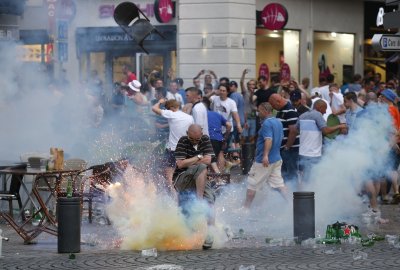By Andrew Warshaw
July 4 – Fourteen countries have signed a potentially ground-breaking convention between the 47-member Council of Europe and UEFA designed to prevent any repetition of hooliganism at future European Championship finals.
UEFA says the convention will include stronger exchange of intelligence to warn countries hosting matches of potential troublemakers.
UEFA have had to dish out a string of charges during Euro 2016 as a result of serious misconduct by fans including those of Russia, England and Croatia and hope the new agreement, which covers “an integrated safety, security and service approach at football matches and other sports events”, will go a long way towards preventing future outbreaks of violence.
“I’m sure that in the future we can use the intelligence of various police forces,” said Dutch FA chief Michael van Praag, head of UEFA’s Stadia and Security committee and a candidate to become UEFA president in September’s election. “That has not been working 100% until now and this is the reason why we have this convention.
“I am sure in the future when this exchange of information between countries and police forces will go on, problems like the one we had in Marseille and in many competitions in Europe will belong in the past.”
“Despite significant progress over the past two decades violence still represents one of the most challenging issues football has to face. But football cannot tackle it alone. We must have effective co-operation and support from police forces. The clashes between English and Russian supporters remind us we must do more to prevent and punish violent behaviour.”
“More than 30 years after Heysel and the previous convention this was high time. We hope all parties will ratify and implement the convention without delay. There must be no sanctuaries for hooligans.
“UEFA is ready to play its part. We are stronger together than we are alone. We must stand up for our values and take our responsibilities and to establish and maintain a zero tolerance policy.”
Van Praag rejects the idea that tournament organisers got it wrong in terms of venues and kickoff times for high risk games, not least that infamous fixture in Marseille between Russia and England that caused such mayhem inside and outside the stadium.
“It’s always easy to say afterwards what somebody should have done. I have deep respect for the abilities of the city of Marseille to organise any match at any risk level and the authorities and UEFA were very well prepared to organise this match in the proper way. Nobody expected this (violence) to happen on such a level. You cannot expect the tournament organisation to beforehand change kickoff times, or beforehand change the venues.
“We knew for months in advance that this match had to be played in Marseille and there were no signals whatsoever that the game would be disturbed in the way it was.”
France, Bulgaria, Georgia, Greece, Lithuania, Moldova, Monaco, Montenegro, Netherlands, Portugal, Russia, Switzerland, Macedonia and Ukraine were the countries who signed up – but significantly not England or Croatia.
Council of Europe Secretary General Thorbjorn Jagland said he expected more countries to put pen to paper, however. “This is the opening day for signing the convention and it is extraordinary that so many signed on the first day, it’s nearly a record. We expect that many will follow suit,” he said.
Contact the writer of this story at moc.l1751422667labto1751422667ofdlr1751422667owedi1751422667sni@w1751422667ahsra1751422667w.wer1751422667dna1751422667

